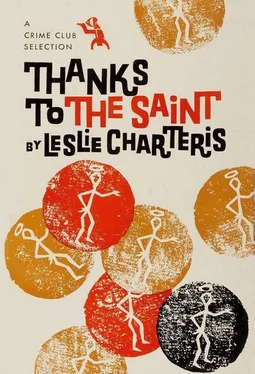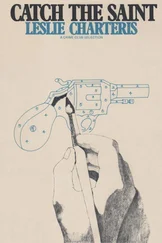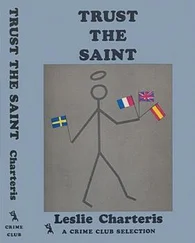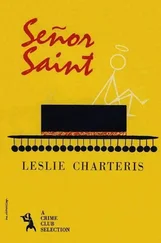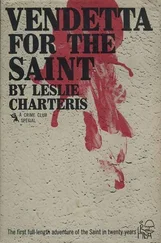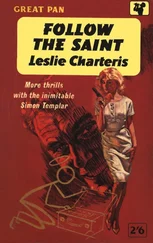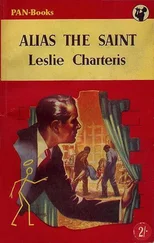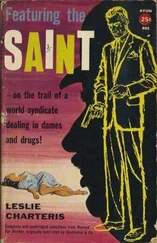Leslie Charteris - Thanks to the Saint
Здесь есть возможность читать онлайн «Leslie Charteris - Thanks to the Saint» весь текст электронной книги совершенно бесплатно (целиком полную версию без сокращений). В некоторых случаях можно слушать аудио, скачать через торрент в формате fb2 и присутствует краткое содержание. Город: Garden City / New York, Год выпуска: 1957, Издательство: Crime Club by Doubleday, Жанр: Детектив, на английском языке. Описание произведения, (предисловие) а так же отзывы посетителей доступны на портале библиотеки ЛибКат.
- Название:Thanks to the Saint
- Автор:
- Издательство:Crime Club by Doubleday
- Жанр:
- Год:1957
- Город:Garden City / New York
- ISBN:нет данных
- Рейтинг книги:5 / 5. Голосов: 1
-
Избранное:Добавить в избранное
- Отзывы:
-
Ваша оценка:
- 100
- 1
- 2
- 3
- 4
- 5
Thanks to the Saint: краткое содержание, описание и аннотация
Предлагаем к чтению аннотацию, описание, краткое содержание или предисловие (зависит от того, что написал сам автор книги «Thanks to the Saint»). Если вы не нашли необходимую информацию о книге — напишите в комментариях, мы постараемся отыскать её.
Thanks to the Saint — читать онлайн бесплатно полную книгу (весь текст) целиком
Ниже представлен текст книги, разбитый по страницам. Система сохранения места последней прочитанной страницы, позволяет с удобством читать онлайн бесплатно книгу «Thanks to the Saint», без необходимости каждый раз заново искать на чём Вы остановились. Поставьте закладку, и сможете в любой момент перейти на страницу, на которой закончили чтение.
Интервал:
Закладка:
Leslie Charteris
Thanks to the Saint
The bunco artists
At this point it may be worth reviewing just once more a field of felony in which Simon Templar won quite a few interesting tourneys in his early years, and in which he exploited most effectively the gift of assuming a pose of fabulous and even fatuous innocence (when a situation called for such a disguise) which was once partly responsible for getting him nicknamed “The Saint.”
I make my excuses to anyone to whom these routines are already old stuff, but the Saint never lost a connoisseur’s and collector’s appreciation of them, and the recapitulation I have in mind may not be entirely dull.
In the simplest basic version of the “confidence” game, the sucker or mark sees a stranger drop a wallet, and naturally picks it up and restores it to its owner. The owner thanks him and keeps on talking to reveal that he is burdened with the job of distributing a huge charitable fund, or some similar sinecure involving the handling of large sums of money: his problem is to find an absolutely trustworthy assistant, and by a happy coincidence the boob who returned the wallet has just given unsolicited proof of unusual honesty. However, the operator has associates who will demand more substantial evidence that the dupe is a man of means who can be trusted with the virtually blank checks they will be handing him, so it is suggested that he bring to a meeting the largest amount of cash he can raise, to exhibit to them to win their confidence — from which theme the racket derives its name. The fool does so, his money is examined and returned to him, his candidacy is unanimously approved with handshakes, and the session rapidly adjourns on promises that formal agreements will be signed with him in a few days. It is not until after the crooks have departed that the victim discovers that the wad of currency which he got back contains only one bill of large denomination, on the outside, while the bulk of it has been dextrously transformed into single dollars or even rectangles of blank paper of the same size.
In one of the commonest variations of this plot, the con men pretend to be making fast fortunes from inside information on horse-racing or the stock market. They allow the dimwit to join in their gambles, and before long he has won, on paper, a small fortune. But when settling time comes, another member of the gang, masquerading as a bookie or a broker, refuses to pay off until the mark shows proof that he could have met his losses if the results had gone the opposite way. Again the fathead digs up all the cash he can raise, with the identical consequence.
Although these tricks have been exposed innumerable times in articles and stories, it is a staggering fact that practitioners of such hoary devices, or closely related mutations of them, are extracting pay dirt with them to this very day.
Often erroneously referred to as forms of the confidence racket, but actually only its kissing cousins, are what the professionals call bunco jobs. In these the ultimate larceny is hardly less barefaced, but the technical difference is that the “confidence” gimmick is not employed. Nevertheless, they also have one distinguishing trait in common, which is the psychology behind the manipulation of the bait which hooks and lands the poor fish who provides the sharper with his dinner.
Simon pointed this out to Mrs Sophie Yarmouth with privileged severity.
“If only respectable people like you weren’t so fundamentally dishonest,” he said, “most of these swindlers would be starved into trying to earn an honest living themselves. But when you’re offered an outrageous bargain, you’re too greedy to stop and think that anything that looks so much like what you’d lightly call a steal is most probably exactly that. You’re so excited by the idea of making a fast buck that you don’t care if the deal involves you in something that’s frankly a little shady. That only makes you feel extra clever, and you’re so fascinated by your own newly discovered business genius that you don’t even have time for the rudimentary precautions that a schoolgirl would take before lending a pal the price of an ice-cream cone.”
“That isn’t true,” Mrs Yarmouth sniffed. “I was thinking of Howard, and how much it might do for him. And if he hadn’t gone off to play some ridiculous cowboy part on location in Wyoming, and left me alone in Palm Springs, I wouldn’t have been exposed to these crooks and made to suffer for only trying to help his career.”
Howard Mayne heroically stifled the temptation to take issue with this gem of feminine logic. He could not really help looking heroic about it, for he was blessed with all the facial qualifications of the rugged type of movie star, and his only trouble was that no Hollywood producer had yet been persuaded to give him a leading role.
“Don’t argue with the man, Aunt Sophie,” he said. “Tell him the whole story, and he may be able to tell you what you can do about it.”
Mr Copplestone Eade (to give him only one of a variety of fine-sounding names which he used) had made Mrs Yarmouth’s acquaintance without difficulty beside a Palm Springs hotel swimming pool and cemented it with a few chats in the lobby, a casual cocktail, an after-dinner coffee and Benedictine in a restaurant where they had found each other eating alone, and one no less apparently spontaneous lunch together beside the same pool where they had met. It was more than enough for Mr Eade to learn that she had a nephew who was a hopeful but not yet very successful actor, and for him to establish that he had been an executive at a couple of major studios and was now embarking on the independent production of films for television.
Mr Eade was then in his fifties, with a fairly well preserved figure, gray hair which he wore just enough beyond ordinary length to seem vaguely artistic without being arty, and the kind of strongly lined face that suggests a man of force and experience, either in business or boudoir, or perhaps both. But there was no hint of romance in his approach, for that was not one of Mr Eade’s habitual methods, and besides he had an extremely jealous wife who had too much on him to take chances with.
Mrs Yarmouth brightly mentioned that he could do worse than consider her nephew for an important part in his projected series, and Mr Eade said courteously but very non-committally that he would be happy to interview him. He had already ascertained that it would be at least two weeks before Howard Mayne would be through with the small part for which he had suddenly been sent off to Wyoming, while Mrs Yarmouth, who was only a visitor from Vermont, had still never seen the inside of a movie studio and would be returning to Hollywood within a week, so that when Mr Eade, before he left the next Monday, insisted that she must call him directly when she got in town and have lunch at the studio and let him show her how movies were made, it was with a comfortable certainty that she would take him up on it, and that he had a few invaluable days ahead in which to arrange the scenery and props which would be essential to the dénouement of the tabloid drama that he had just nursed through a neat and fertile first act.
The studio which Mr Eade used for a setting was entirely legitimate, being merely an incorporated agglomeration of real estate and architecture which was in business solely to rent space and facilities to all comers, without interest in their projects or product, so long as they had the requisite credit rating or better still the cash. Mr Copplestone Eade’s credit might have evoked no raves from Dun & Bradstreet, but he always had a working reserve of cash, since bunco is one of the most capitalistic kinds of crime, and his requirements were relatively modest, consisting at this point mainly of office space in an enclave where movies were in fact busily and evidently being made.
Читать дальшеИнтервал:
Закладка:
Похожие книги на «Thanks to the Saint»
Представляем Вашему вниманию похожие книги на «Thanks to the Saint» списком для выбора. Мы отобрали схожую по названию и смыслу литературу в надежде предоставить читателям больше вариантов отыскать новые, интересные, ещё непрочитанные произведения.
Обсуждение, отзывы о книге «Thanks to the Saint» и просто собственные мнения читателей. Оставьте ваши комментарии, напишите, что Вы думаете о произведении, его смысле или главных героях. Укажите что конкретно понравилось, а что нет, и почему Вы так считаете.
